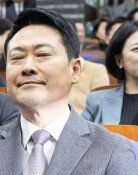People turn back on ruling party
People turn back on ruling party
Posted April. 27, 2001 19:35,
The outcome of the Apr. 26 local elections is obliging the ruling Millennium Democratic Party (MDP) to conduct a stringent self-examination. The MDP`s election defeats in all of the four districts eloquently attests that the people`s confidence in the governing party has been lost. In particular, the MDP`s losses in the two elections in North Cholla Province, a traditional power base of the MDP, demonstrate that public antagonism to the ruling camp is nationwide.
The MDP leadership contends that the election returns were not so meaningful as the elections were only held in some districts. But its assertion is wrong. Although the latest elections were held in a limited number of areas, they provide evidence of the public`s opinion concerning the merits and demerits of the incumbent administration. Mindful of this, the MDP`s leadership came to support its candidates with all available means, but now that its party has been trounced, it is trying to reduce the significance of the voting.
The government and the MDP should come up with a sincere attitude to restore people`s confidence in them, even if they stop short of humbly admitting their election defeat. The ruling camp ought to realize why it was defeated in the elections by reflecting on its past mismanagement of state affairs, such as the premature enforcement of the policy to separate the roles of doctors and pharmacists without adequate preparations, in addition to its failures to put the economy on the right track and rejecting inter-party coexistence or survival.
What is more, the ruling camp may well ask questions about whether its pursuit of a strong government failed to gain a popular consensus, and whether this failure prompted president Kim Dae-Jung to adopt an uncompromising political position. Also cited as factors that adversely influenced the electors are, among other things, the indecisive measures to cope with the aftermath of the brutal crackdown by riot police on the striking unionists of Daewoo Motor in Inchon, the wavering posture on the legislation of the pending reform bills and conflicts with the opposition Grand National Party concerning trifling matters while leaving important legislative programs unattended.
In short, the public distrust of the government and the MDP shown in the local elections boils down to its total administrative and political failures. Although economic woes and hardships in the people`s lives are deepening, the governing camp is not endeavoring to address the people`s grievances. Instead it is confronting popular voices critical of the ruling camp with hostility and emotion, consequently deepening the people`s complaints and sense of insecurity. Worse yet, the premature power struggles among the presidential hopefuls for the 2002 election are considered to have turned the people even further away from the government camp.
So long as the ruling power fails to address these public misgivings, no national sectors, political, economic or social, can function properly. The government and the ruling party should humbly accept the results of the recent elections and try to find out what the people really want. The ruling camp needs to exert more effort to cultivate its capability for politics in the best interests of the general public, rather than attempting to capitalize on the numerical superiority of its lawmakers. In its relations with the opposition GNP, the MDP should make a similar endeavor to improve their bipartisan ties.







